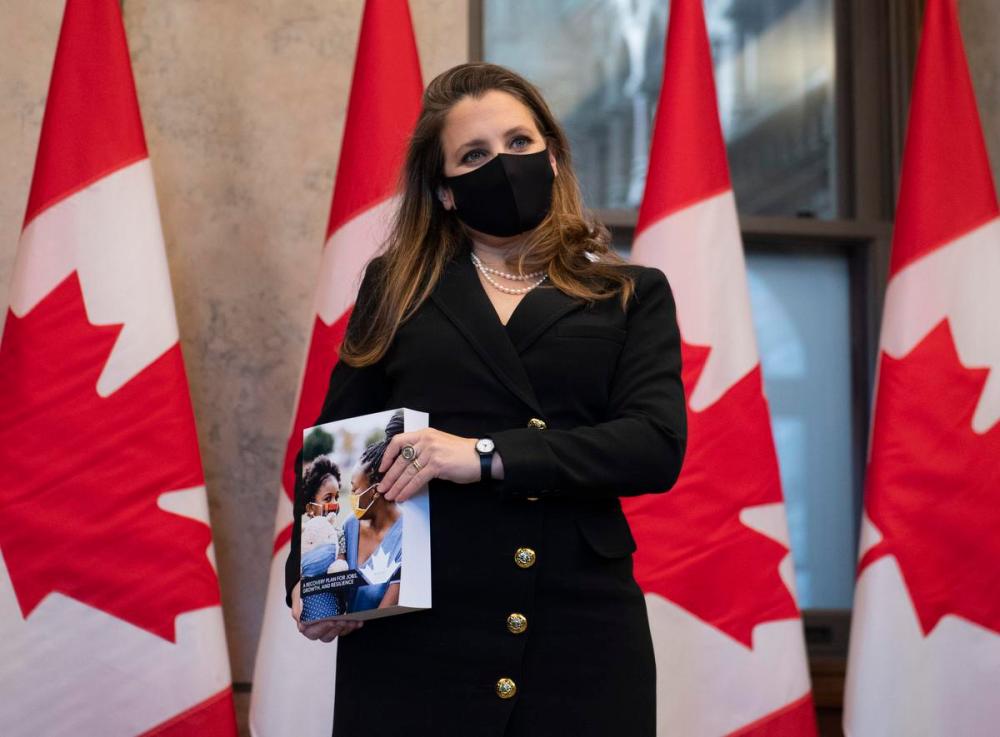Federal budget 2021: Here are the winners and the losers
Advertisement
Read this article for free:
or
Already have an account? Log in here »
To continue reading, please subscribe:
Monthly Digital Subscription
$0 for the first 4 weeks*
- Enjoy unlimited reading on winnipegfreepress.com
- Read the E-Edition, our digital replica newspaper
- Access News Break, our award-winning app
- Play interactive puzzles
*No charge for 4 weeks then price increases to the regular rate of $19.00 plus GST every four weeks. Offer available to new and qualified returning subscribers only. Cancel any time.
Monthly Digital Subscription
$4.75/week*
- Enjoy unlimited reading on winnipegfreepress.com
- Read the E-Edition, our digital replica newspaper
- Access News Break, our award-winning app
- Play interactive puzzles
*Billed as $19 plus GST every four weeks. Cancel any time.
To continue reading, please subscribe:
Add Free Press access to your Brandon Sun subscription for only an additional
$1 for the first 4 weeks*
*Your next subscription payment will increase by $1.00 and you will be charged $16.99 plus GST for four weeks. After four weeks, your payment will increase to $23.99 plus GST every four weeks.
Read unlimited articles for free today:
or
Already have an account? Log in here »
Hey there, time traveller!
This article was published 19/04/2021 (1703 days ago), so information in it may no longer be current.
Ottawa’s historic budget featuring more than $100 billion in new spending aimed at stimulating the post-pandemic recovery includes a promise of affordable child care for all and efforts to fight climate change. But Finance Minister Chrystia Freeland’s first budget was also likely to disappoint some people as well.
Here’s a breakdown of the winners and losers.
WINNERS

Parents
Parents, especially those of future toddlers, were promised a push to have $10-dollar-a-day child care across Canada by 2026. Ottawa aims to split the costs with provinces 50/50, pending agreements with the provinces, and has earmarked an initial $30 billion to be spent over the next five years.
After 2026 an additional $9.2 billion per year will be spent by the federal government on child care.
One of the first goals will be to cut the average fees of regulated child care by 50 per cent by the end of next year. Quebec has long had a provincial child care program and British Columbia has been working on introducing one since 2018.
Small business
Programs meant to aid small and medium-sized businesses during the pandemic will be extended once again, with the rate of wage and rent subsidies being gradually decreased staring in July. The extension of the wage subsidy is expected to cost $10 billion, while the rent subsidy is expected to run the government $1.9 billion.
At the same time, the feds will be phasing in hiring subsidies and micro grants to aid companies in moving more of their work online. Freeland said the aim of the plan is to “punch our way out of the COVID recession.”
Environmentalists
Ottawa’s climate plan is being bolstered with a $17.6-billion cash injection intended to help cut down on greenhouse gases over the next decade. Monday’s budget aims to spur the private sector to speed up Canada’s shift to a low-carbon economy reaching for net-zero emissions by 2050.
The budget has earmarked $5 billion over the next seven years to “support industrial transformation” through helping heavy polluters like the oil and gas sector reduce emissions.
LOSERS
Budget hawks
Fiscal hawks were let down by Monday’s budget as the Liberal government continued to spend huge sums of money, running up eye-popping levels of debt. The $354-billion deficit this year and a projected $154 billion next year come with the hope stimulus measures will reward public coffers down the line.
The government is planning to have a smaller deficit by 2026 at $30 billion. For decades balanced budgets were a major point of accountability for governments in Canada, but amidst the backdrop of the pandemic the Liberals are betting such concerns are less paramount than in the past.
Restaurants
Though small business overall came out of Monday’s budget with some help the COVID-battered restaurant sector specifically doesn’t appear to be getting any aid. Restaurants Canada estimates eight in 10 eateries are still losing money even with pandemic subsidies and aid programs.
Restaurants and pubs have been ravaged by restrictions placed upon them to help curb the spread of COVID-19, including bans on indoor dining.
Canadians struggling to pay for medical drugs
Those hoping for some help to pay for their pharmaceuticals in Monday’s budget were also let down as child care and other initiatives were championed instead.
The Liberals promised during the 2019 federal election campaign to create a national universal pharmacare program. Monday’s budget only addressed the issue in passing, asserting that the federal government is committed to working with the provinces, territories and stakeholders to “build on the foundational elements already in progress.”
With a file from The Canadian Press
Jeremy Nuttall is a Vancouver-based investigative reporter for the Star. Follow him on Twitter: @Nuttallreports


